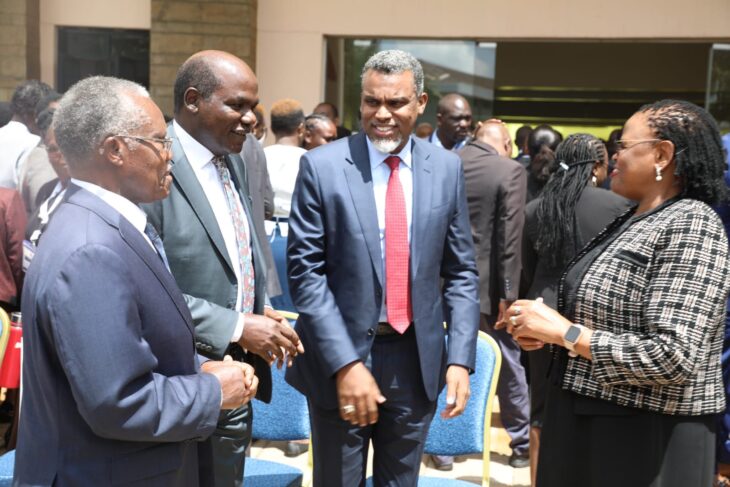NAIROBI, Kenya, Jul 16- In three weeks, Kenya goes to a transitional election, but the big question remains, is the country ready?
On whether or not the country has learned from its past, is a wait-and-see situation a few days before the August 9 elections.
A section of stakeholders have raised pertinent issues around the credibility of the exercise but an underfunded Independent Electoral and Boundaries Commission says it is ready.
Human Rights organizations have also raised a series of concerns, among them the preparedness of police to provide security during the election day, and subsequent days.
Others, like a consortium of more than 10 local organizations have expressed concern over the continued involvement of government officials and more so those in the Office of President, in politics.
They singled out Interior Cabinet Secretary Dr. Fred Matiangi and principal secretary Karanja Kibicho, whom they have now asked, “to keep off from politics.”
Both have publicly campaigned for Raila Odinga, who is President Uhuru Kenyatta’s preferred successor.
Is the country ready for a free, fair, and credible election?
Human Rights lawyer Demas Kiprono says the country goes to the elections with the same problems that it had in 2017, “from a policy standpoint.”
“We are only a few weeks to the general elections. We have had so much time and resources to learn from our past mistakes,” he said.
In 2007, Kenya lost more than 1,000 lives in post-election violence that left 600,000 others internally displaced. This was after a disputed presidential outcome.
Following the 2017 nullification of the presidential election, Kiprono pointed out that IEBC was to carry out a set of measures including proposing amendments to electoral laws, but that has not happened.
A list of key amendments that would have helped in addressing concerns around the transmission of votes was taken to parliament late and all rejected.
“There are certain legal requirements that have not been met…the law that was proposed to deal with the issue of transmission of votes.”,” he said during a Twitter Space hosted by the Crime Journalists Association of Kenya, in partnership with the Independent Medico-Legal Unit.
The IEBC has maintained that manual registers will only be used in case the digital registers fail to work.
“This time we are saying instead of three kits as were the case in 2017 per ward, we have doubled them to six kits. If there is a total failure, we will replace the kits. If it fails, we will bring the third kit. Assuming all the kits are not working, that is the time when we can revert to a manual register,” IEBC commissioner
Abdi Guliye said on July 7 during a meeting with stakeholders.
“The manual register that people are complaining about is printed out of the digital register. So, it is not coming from the moon. There will be no way you will be in the manual register which is in the book and not be in the digital register.”
The weekly spaces are supported by the Canadian Embassy in Kenya.
“It is the elections that trigger issues that we’ve had,” Kiprono pointed out.
The electioneering period in Kenya has in the past been characterized by incidents of protests from aggrieved Kenyans.
During such incidents, police have been accused of using excessive force, which has led to the loss of lives and injuries.
“One of the concerns that we have is that if people were recruited in March, are they properly trained (to provide security services during the polls),” Jane Muhia, a Program Officer, Civic Space, Law and Policy at Article 19 said.
A recent report by IMLU said police officers were not ready to provide security services during the polls and more so on crowd management.
“Police are usually excited to use excessive force when dealing with civilians,” Muhia lamented. “You are supposed to apply force that it is proportionate to the threat.”
IMLU elections coordinator Jackline Kwanusu said for the election to be successfully held, all players must be involved.
She specifically rooted for solutions that are tailor-made for the people.
Meanwhile, there have been accusations of rigging plans, but the IEBC has dismissed them.
“IEBC is independent and not answerable to any individual or authority but to the Constitution. We cannot allow external forces to come and influence what we do,” IEBC chairperson Wafula Chebukati recently told journalists.
He has however said that a section of his staff and more so those in the ICT department are worried due to public profiling.
In 2017, the then IEBC ICT boss Chris Msando was abducted, tortured, and strangled to death, days ahead of the polls.
“It’s very unfortunate and for those making those remarks, he is a Bukusu like me and we were born in Bungoma that’s the reason perhaps for profiling. I have never sat with an individual to discuss procurement,” he said.
A section of Azimio la Umoja – One Kenya coalition leaders had alleged that Chebukati and Kenya Kwanza principal Moses Wetangula were the masterminds who solicited for the ballot papers printing tender to be awarded to a Greek Firm.
“It’s very unfortunate that some leaders can stoop so low to try at this point time to malign the character of the chair. I want to tell the commission to focus on talking to the electorate on issues,” Chebukati said.
Want to send us a story? Contact Shahidi News Tel: +254115512797 (Mobile & WhatsApp)


